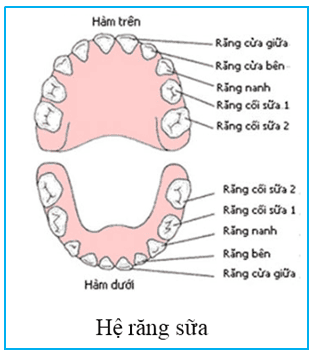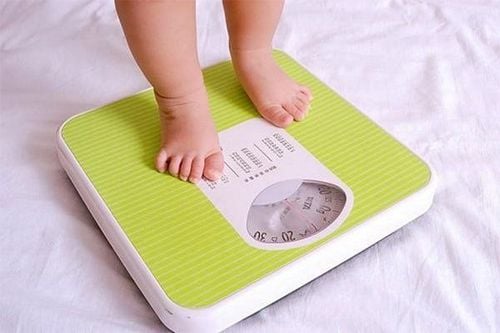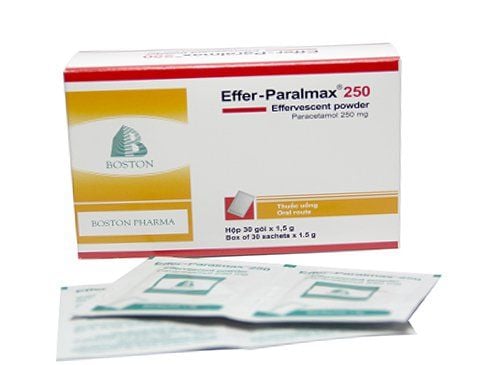This is an automatically translated article.
The article was consulted professionally by Assoc. Dr. Dr. Huynh Thoai Loan - Head of Pediatrics - Neonatology Department, Vinmec Central Park International General Hospital. Uncle is one of the leading experts in Pediatrics - Neonatology in Ho Chi Minh City with nearly 30 years of experience in examining and treating diseases of pediatric endocrinology, pediatric nephrology and other pediatric - neonatal issues.Baby teeth usually erupt when the child is 6 months old and complete after 2.5 - 3 years. However, the timing of baby teeth eruption can still vary within 1 year. Therefore, if a 7-month-old child has not had teeth yet but still develops normally, parents should not be too worried, because this may be physiological delay in teething.
1. Baby teeth eruption time
In children, normally all 20 crowns of milk teeth have formed and are located in the jawbone. After a period of time, baby teeth will begin to grow out of the jawbone and gums. Each baby usually needs from 2.5 to 3 years to fully develop these 20 baby teeth.
Specifically, the order and time of full eruption of baby teeth in specific children is usually:
From 6 to 9 months: Four middle incisors. The baby's first baby tooth will appear around 6 months and in the lower jaw position. Usually, the first tooth will cause discomfort for the baby, often crying, even refusing to breastfeed and have a low fever, some children also have diarrhea. The two upper front teeth will continue to grow when the baby turns 8 months. From 7-10 months: Two side incisors. The two lateral incisors of the lower jaw usually appear later, erupting when the baby enters the 16th month of life. From 12-14 months: 4 baby molars. After the incisors fully erupt, the molars will begin to appear. At this time, mothers need to pay more attention to their children's oral care to prevent dental diseases. From 16 to 18 months: 4 milk canines. Baby canines on the upper papillae will fill in the space between the incisors and molars. The two lower canines appear later. From 20 to 30 months: The last four primary molars. When the last two molars of the lower jaw erupt, in succession will be the appearance of the last two molars of the upper jaw.

Hệ răng sữa của trẻ
2. Why is the child's teething slow?
In fact, some babies have their first 2 front teeth as early as 4, 5 months old. There are also babies who grow these 2 teeth later at 9 - 10 months old. Thus, according to the above procedure, it is not too late for a 7-month-old baby to have teeth. Even children 7 and a half months without teeth, parents should not be too worried.
If the baby is slow in teething but still develops well both physically and mentally, it is not a cause for concern, because it is highly likely that this is a physiological delay in teething.
In case the baby's teething is delayed along with other signs such as: slow weight gain, height does not increase or increase little, lazy to eat, curly hair, ... then the mother should take the baby to the hospital for examination. reputable pediatric clinic.
Children 7 months without teeth may have some other causes such as:
Genetics. Premature babies Due to the late introduction of solid foods by parents, the gums and teeth are not stimulated by the chewing and swallowing reflex. Due to nutrition: children suffer from malnutrition, growth retardation, lack of calcium, vitamin D and other necessary nutrients. Nutritional factors for babies are an important factor affecting the process of teething in children, and also something that parents are extremely concerned about.

Tại sao trẻ chậm mọc răng?
When the child has delayed teething, if combined with signs of a general nutritional deficiency such as delayed growth in weight and height, and symptoms of rickets such as not sleeping well at night, or crying suddenly screaming, crying, fainting all over, night sweats, flattened skull, flat chest, wide fontanelle... the delay in teething in children is due to rickets. In this case, it is necessary to increase the daily nutritional intake for the child.
Some cases of children with delayed teething may be due to a lack of calcium to develop tooth buds. The main food of a baby in the early stages of life is milk, which is often rich in calcium. However, if the baby is breastfed, but the mother's diet is not enough nutrients, it can reduce the quality of milk supply.
Baby food should also not have too much phosphorus (found in many fruits and vegetables), because the phosphorus ratio is too high, the absorption of calcium will also be reduced.
Vitamin D is essential for calcium absorption, which can be provided to children from both food and sunlight. In infants, more vitamin D comes from sunlight. Proper sunbathing for children helps children's bones and teeth develop better, the body is healthier.
Parents can ask a nutritionist for more support about their child's diet. In addition, to be more sure, parents can take their baby to the hospital's Pediatric Department for examination and consultation with a doctor. If something goes wrong, your doctor may order an X-ray or do the necessary tests to determine if something is wrong.
Besides, parents also need to supplement their children with essential micro-minerals such as zinc, lysine, chromium, selenium, vitamin B1, ... to fully meet the nutritional needs of children. The addition of these essential vitamins also supports digestion, enhances nutrient absorption, improves anorexia, and helps children eat well. Parents can simultaneously apply dietary supplements and functional foods derived from nature for easy absorption. The most important thing is that improving your baby's symptoms often takes a long time. The combination of many types of functional foods at the same time or continuously changing many types in a short time can cause the baby's digestive system not to adapt and completely not good. Therefore, parents must be really patient with their children and regularly visit the website vimec.com to update useful baby care information.














